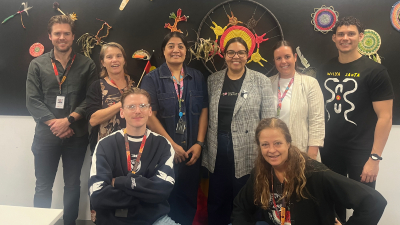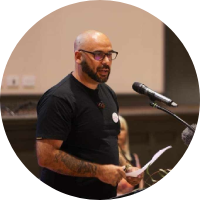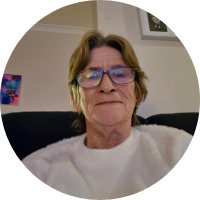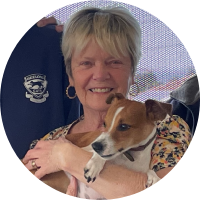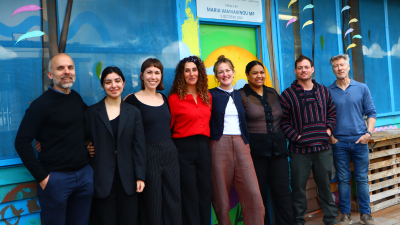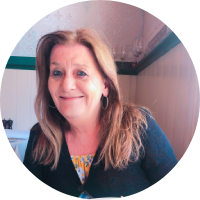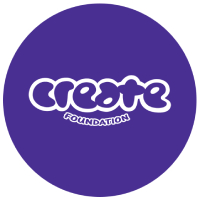The 2025 Victorian Protecting Children Awards winners were announced at the awards ceremony on Tuesday 2 September 2025, in the lead up to Child Protection Week.
The winners and their outstanding achievements can be found on this page under ‘2025 award winners’.
Congratulations to all the winners being recognised for their exceptional efforts towards driving positive outcomes for children, young people and families across Victoria.
On this page
The Victorian Protecting Children Awards celebrate the incredible work and passion of people from across the child and family services sector, and the community.
Every day, dedicated individuals, teams and groups face a wide range of challenges and opportunities…all with the shared goal of helping children, young people and families to thrive.
Year after year, the judging panels are impressed by the number and the quality of award nominations.
This recognition highlights the exceptional commitment and effort that are hallmarks of everyone working in the sector and community.
And now is the time we celebrate and show our appreciation for each other.
Appreciation for the dedication that has a meaningful impact on the lives of children, young people and families in Victoria.
From working with families to keep at-risk children and young people safe… to empowering Aboriginal self-determination and cultural safety…to delivering critical support programs and engaging young people with education…to community champions who support strong connections and provide caring homes.
We are all one big team empowering and supporting children, young people and families together.
So, let's shine a light on all the incredible individuals, groups and teams, because you all truly make a difference.
Two of the pre-eminent awards are named in honour of the work of Robin Clark.
Robin was a pioneer in child and family-related policy and practice in the 1980s and 1990s, and was an inspiring leader. These awards celebrate leadership and devotion to children, young people and families.
Your drive and compassion is truly amazing – and your unwavering commitment to making positive change is remarkable.
Each of you help to keep children and young people safe, and families strong.
Together, we make a difference!
[End]
The Victorian Protecting Children Awards celebrate the incredible work and passion of people from across the child and family services sector, and the community.
Every day, dedicated individuals, teams and groups face a wide range of challenges and opportunities…all with the shared goal of helping children, young people and families to thrive.
Year after year, the judging panels are impressed by the number and the quality of award nominations.
This recognition highlights the exceptional commitment and effort that are hallmarks of everyone working in the sector and community.
And now is the time we celebrate and show our appreciation for each other.
Appreciation for the dedication that has a meaningful impact on the lives of children, young people and families in Victoria.
From working with families to keep at-risk children and young people safe… to empowering Aboriginal self-determination and cultural safety…to delivering critical support programs and engaging young people with education…to community champions who support strong connections and provide caring homes.
We are all one big team empowering and supporting children, young people and families together.
So, let's shine a light on all the incredible individuals, groups and teams, because you all truly make a difference.
Two of the pre-eminent awards are named in honour of the work of Robin Clark.
Robin was a pioneer in child and family-related policy and practice in the 1980s and 1990s, and was an inspiring leader. These awards celebrate leadership and devotion to children, young people and families.
Your drive and compassion is truly amazing – and your unwavering commitment to making positive change is remarkable.
Each of you help to keep children and young people safe, and families strong.
Together, we make a difference!
[End]
About the awards
The annual Victorian Protecting Children Awards honour individuals, teams and groups who demonstrate excellence in working with children, young people and families.
These prestigious awards have been running for 22 years, showcasing the remarkable effort and passion across the Victorian child and family services sector and community.
There are 12 award categories which were open to recognise those who help ensure children, young people and families are safe, supported and thriving.
Nominations were open to people working across the child and family services sector, child protection, government and academic organisations, foster, kinship and permanent carers, volunteers and community members.
The 2025 VPCA received 178 nominations, which broke a new record for the fourth year in a row!
Key dates 2025
- Nominations opened: Tuesday 4 March
- Extended nominations period closed: Thursday 10 April at 5:00 pm
- Judging period: May
- Screening period: June to July
- Finalists announced: Tuesday 29 July
- Awards ceremony: Tuesday 2 September, in the lead up to Child Protection Week.
2025 award winners
[Trish McCluskey, winner of the Robin Clark Leadership Award] We're at the wonderful MCG and we're celebrating the 2025 Victorian Protecting Children Awards.
It's really important that we have events like the Protecting Children Awards, because the work that's done, so often gets unrewarded, unnoticed.
[Astrid Decloux, member of Project REAL – Banksia Gardens Community Services winner of the Engaging Kids in School Award] I think it's extremely important. We really need to raise advocacy and awareness, but also change the way in which we look at children and families.
[Zee Pepper, winner of the Walda Blow Aboriginal Children and Young People Award] A lot of us, you know, we hold the same values in the work that we do with, young people and children that we’re supporting and I think it's important to celebrate that.
[Trish McCluskey] So for one week a year, we get to say in a small way, but significant and sincerely, thank you.
[Astrid Decloux] My name is Astrid Decloux and I currently work for Banksia Gardens Community Services, Northern Centre.
[Zee Pepper] My name is Zee Pepper. I'm a proud Gunaikurnai person. I'm also a really proud, open and visible transgender man.
[Trish McCluskey] My name is Trish McCluskey, and I'm the Director for Commonwealth Operations at the Department for Families, Fairness and Housing.
[Astrid Decloux] I am a Learning Specialist and so I work with school leadership teams in our Project REAL re-engagement program.
We help build trauma responsive practice with the local schools. And we get to really work closely with our kids and families that are nominated for our program.
[Zee Pepper] One of the most rewarding parts of my job would be working towards implementing an inclusive, safe and affirming services for, our young queer mob and staff at VACCA.
[Trish McCluskey] A really rewarding part of my job is that I get to work with people who are leaders in their own fields, but in particular, we're able to do a lot of work that puts us at the forefront of protecting refugee children, asylum seeking children and children from multicultural backgrounds who are involved with child protection.
[Astrid Decloux] We are a group of helpers and often helpers don't stop to pause and acknowledge themselves. And although it's not about us, it starts with us and it's a big piece.
[Trish McCluskey] I'm very lucky to be a nominee, for the Leadership Award. And I think the thing I'd most like to say to my colleagues, and to other people who are aspiring for leadership, is that I think the most important quality in leadership, which I've learned over decades in child protection, is the ability to be courageous and the willingness to stand up and speak for the people who can't do it for themselves.
End transcript.
[Trish McCluskey, winner of the Robin Clark Leadership Award] We're at the wonderful MCG and we're celebrating the 2025 Victorian Protecting Children Awards.
It's really important that we have events like the Protecting Children Awards, because the work that's done, so often gets unrewarded, unnoticed.
[Astrid Decloux, member of Project REAL – Banksia Gardens Community Services winner of the Engaging Kids in School Award] I think it's extremely important. We really need to raise advocacy and awareness, but also change the way in which we look at children and families.
[Zee Pepper, winner of the Walda Blow Aboriginal Children and Young People Award] A lot of us, you know, we hold the same values in the work that we do with, young people and children that we’re supporting and I think it's important to celebrate that.
[Trish McCluskey] So for one week a year, we get to say in a small way, but significant and sincerely, thank you.
[Astrid Decloux] My name is Astrid Decloux and I currently work for Banksia Gardens Community Services, Northern Centre.
[Zee Pepper] My name is Zee Pepper. I'm a proud Gunaikurnai person. I'm also a really proud, open and visible transgender man.
[Trish McCluskey] My name is Trish McCluskey, and I'm the Director for Commonwealth Operations at the Department for Families, Fairness and Housing.
[Astrid Decloux] I am a Learning Specialist and so I work with school leadership teams in our Project REAL re-engagement program.
We help build trauma responsive practice with the local schools. And we get to really work closely with our kids and families that are nominated for our program.
[Zee Pepper] One of the most rewarding parts of my job would be working towards implementing an inclusive, safe and affirming services for, our young queer mob and staff at VACCA.
[Trish McCluskey] A really rewarding part of my job is that I get to work with people who are leaders in their own fields, but in particular, we're able to do a lot of work that puts us at the forefront of protecting refugee children, asylum seeking children and children from multicultural backgrounds who are involved with child protection.
[Astrid Decloux] We are a group of helpers and often helpers don't stop to pause and acknowledge themselves. And although it's not about us, it starts with us and it's a big piece.
[Trish McCluskey] I'm very lucky to be a nominee, for the Leadership Award. And I think the thing I'd most like to say to my colleagues, and to other people who are aspiring for leadership, is that I think the most important quality in leadership, which I've learned over decades in child protection, is the ability to be courageous and the willingness to stand up and speak for the people who can't do it for themselves.
End transcript.
Winner: Dr Trish McCluskey – Department of Families, Fairness and Housing
Trish demonstrates an unwavering dedication in advocating for children of diverse cultures and faiths and those who have experienced trauma and upholding their foundational rights.
Trish leads a team that undertakes the complex work of progressing visa and immigration matters for refugee children and supporting their settlement from conflict zones around the world.
Trish has created programs such as the Cultural Engagement Program, aimed at preventing multicultural children from entering statutory care. The Stronger Futures for Refugee Youth program supports young people to transition from care and succeed as young adults.
Trish encourages young people to not be defined by trauma, rather to see and expect a strong future. This model and the empowerment of what young people are capable of has enabled unparalleled results.
To secure student placements and internships for young people, Trish has supported partnerships with Universities and TAFES and enterprises such as NASA and the Australian Broadcasting Cooperation.
Trish’s advocacy and interventions have influenced policy and practice in Victoria and beyond.
Winner: Aboriginal Children’s Healing Team, Yinga Healing Group – Victorian Aboriginal Child and Community Agency (VACCA)
The Aboriginal Children’s Healing Team developed the statewide Yinga Healing Group for Aboriginal and Torres Strait Islander children and young people.
The group promotes social, emotional and spiritual healing to improve the wellbeing of children and young people in at-risk families or in care services.
To strengthen community connections, the group involves yarning and learning through storytelling and cultural activities. It also incorporates evidence-based models and trauma informed therapeutic approaches to healing.
Aboriginal leaders and clinicians collaborate to determine effective approaches for integrating culture into clinical responses.
Every child and young person has the benefit of a culturally appropriate multi-disciplinary team. This includes allied health professionals, social workers, counsellors, psychiatrists, practitioners and leaders with lived experience and cultural expertise.
The team also involve the support systems surrounding the child or young person, such as parents, families, carers, community, caseworkers, teachers and health professionals.
The team seek feedback from young people on what their experience in the group to ensures their voices empowered
Winner: Corey Harrison – Victorian Aboriginal Child and Community Agency (VACCA)
Corey’s drive is to ensure Aboriginal children, young people and families are protected and remain culturally supported, connected and self-determined.
Corey has close connections to the Aboriginal community and various groups to empower local Aboriginal Community Controlled Organisations.
During the pandemic, Corey created a video with senior Aboriginal staff on mental health messaging. This video remains one of VACCA’s most viewed with over 15,000 likes and 203 shares.
Corey was instrumental in implementing VACCA’s Nugel program in Inner Gippsland and Western Metropolitan regions.
The program offers a model of Aboriginal-led child protection practice as part of the Aboriginal Children in Aboriginal Care program. VACCA works in partnership with Aboriginal families to keep children and young people safe and connected. Under Corey’s leadership, those in the program take an active role in decision making.
Corey advises on VACCA’s Gamidji Balit residential care program. Corey also established the West Metro Aboriginal Governance Group, which supports local ACCOs to build knowledge and further understanding of government strategies.
Winner: Lesley Brechin – Anglicare Victoria
Lesley has been a foster carer for 21 years and has cared for over 40 children and young people, ranging from overnight to long term placements. Lesley has provided these children and young people with a nurturing family environment and exceptional care.
Lesley’s first foster care placement was with a young sibling group. These children reached adulthood in Lesley’s care and remain connected to this day.
Lesley provides care to children with complex medical and physical needs including, a child who - without Lesley’s care - would have remained living in the hospital.
Skilled in using non-verbal cues, changes in appetite and other behaviours, Lesley can detect pain or symptoms that require immediate attention.
Lesley has been a driving force to explore, with allied health teams, the available options to enable a-typical communication platforms to give children the ability to connect.
Feedback from medical staff affirms Lesley’s ability to tune into the needs of the child to achieve improved outcomes.
Winner: Patricia Barton
Patrica’s life has been dedicated to helping others and empowering children and young people to have a voice.
Patricia was described by a care leaver as “not the woman who gave birth to me, but the person who helped heal my heart and find hope in the midst of the most traumatic years of my life”.
Patrcia connects children and young people with complex needs to the right supports to learn who they are and to flourish.
One of the children dreamed of being an Olympian, Patricia supported the child's goals by travelling across Victoria for them participate in sport.
To give a child the best start in life, Patricia funded a semi-private education out of a pension fund.
Through support, encouraging interests and unpacking stressors, Patricia helps children and young people to know they are capable and empowered to break intergenerational trauma.
Patricia shows that family is not always related by blood and remains a parental and grandparental figure in the lives of care leavers.
Winner: Project REAL – Banksia Gardens Community Services
Project REAL is a re-engagement program supporting students aged 9 – 12 years who are disengaged with education.
The program is a flexible learning option which is now regarded as a benchmark of effective practice for flexible learning.
The team works with students, their families and carers, and partner schools to ensure every child's right to education is a reality and not just an ideal.
The team provides practical support to break down barriers to school engagement, with family support plans, and at times including school pick-ups and drop-offs or organising lunches.
Since 2017, Project REAL has supported close to 60 children to re-engage in learning, as well as participate in activities like sports, music and school camps.
Prior to Project REAL, some students had not attended school for extended periods of time. Others were presenting with low impulse control and limited capacity to regulate their emotions.
Most children in the program have shown improvements in attendance, social and emotional skills and responsible decision making.
Winner: Lisa Cappola – Anglicare Victoria
Lisa has over 25 years’ experience in residential care and demonstrates exceptional leadership and dedication to at-risk youth.
Lisa’s knowledge, trauma-informed methodologies and ability to forge meaningful connections have been pivotal in safeguarding and transforming countless lives.
Lisa played a key role in the North with the transition to the KEYS program which provides an individualised trauma-informed approach.
Lisa creates an environment where children, young people, and their families and carers are active participants in shaping their futures with long-term stability and growth opportunities.
A notable example is Lisa’s role in facilitating the smooth transition and successful reunification of a young person with their family.
To deliver holistic care, Lisa’s leadership style is collaborative with a multidisciplinary team. Lisa has established partnerships with services such as the Victorian Aboriginal Child and Community Agency and Youth Support and Advocacy Service.
Lisa ensures Aboriginal children and young people remain connected to their culture and appropriate services, recognising the importance of cultural identity in overall wellbeing.
Winner: Zoe Stamatopoulos – MacKillop Family Services
Zoe has shown a thorough understanding of trauma informed practice throughout interactions with young people in care.
By listening to the voices of the young people, Zoe develops strong rapport while providing support. Zoe drives the importance of self-care and promotes that all children deserve the chance to be themselves and to have fun.
Under Zoe’s guidance, a young person embarked on their first ever interstate trip to Queensland where they got to experience theme parks and fun activities. This was possible as the young person advocated for themself with confidence to be able to go on the school camp.
Zoe also empowered the young person to be involved and play an important role at their school concert.
Zoe provided transport for family members so that they could watch and share the special moment with the young person.
Zoe has advocated for young people and provided hope when some had lost sight of it.
Winner: Salesian College Chadstone Child Safety Committee
The Salesian College Chadstone Child Safety Committee is made up of students and college staff to implement projects that support a child safe culture for all students.
The committee developed a child safety framework, child safety standards action plan, student concerns process, and a diversity and inclusion policy.
A key committee initiative was the student concerns process. Developed and implemented by students, the purpose is to empower students to report issues for the school to promptly action.
The co-design between staff and students has fostered respectful relationships and ensured diverse ideas.
Students are empowered to present ideas, seek feedback from peers and design initiatives. Items are discussed at committee meetings, with student voices informing decisions for how to deliver solutions and offer support.
Students have presented in school assemblies and widely communicate their initiatives and documents to students, parents and staff.
The Salesian College Chadstone Child Safety Committee is a great example of student agency and empowerment.
Winner: Bronwyn Pike AM – Uniting Vic.Tas
Bronwyn has an unwavering dedication to child, youth, and family services.
Bronwyn has shaped the future of generations of Australians. Initially as a teacher and then through serving as the Director of Justice and Social Responsibility with the Uniting Church.
In 1999, Bronwyn entered Victorian Parliament, representing Melbourne for more than 12 years.
During this time, Bronwyn held key ministerial roles, including housing, health, aged care, community services and education.
Post-politics, Bronwyn continued advocacy work as Chief Executive Officer of Uniting Vic.Tas, leading the unification of the organisation’s founding agencies.
Bronwyn has also chaired numerous boards, including the Victorian Council of Social Services and Western Health.
Bronwyn was awarded a Member of the Order of Australia in 2022 for lifelong commitment to social welfare.
Seeing the next generation grow and embody the passion for working in child and family support services gives Bronwyn satisfaction in the work and optimism for the future.
Winner: Zee Pepper – Victorian Aboriginal Child and Community Agency (VACCA)
As a proud transgender Gunai Kurnai man, Zee has worked tirelessly to ensure inclusivity for Aboriginal and Torres Strait Islander LGBTIQA+SB (rainbow mob) children, young people and their families and carers.
Zee has worked through VACCA's accreditation with the National Rainbow Tick Standards.
Zee has co-delivered VACCA's inclusivity training. This has resulted in increased confidence and understanding for staff on the importance of LGBTIQA+SB inclusivity and creating a safe space.
To help ensure children and young people understand their rights, Zee led the development of VACCA's easy to read information packs. Topics include privacy, inclusivity and connection to culture, self-determination and their voice being heard.
Zee’s visibility in the Aboriginal community, including events and social media campaigns demonstrates a commitment to empowering the LGBTIQA+ SB community and for people to feel safe expressing their identities.
Zee was the recipient of the 2024 Inaugural Victorian NAIDOC Pride Award. Zee advocates and campaigns for Rainbow mob to be seen and understood, and to feel safe expressing themselves.
Winner: Carley White – Department of Families, Fairness and Housing
Carley is a well-regarded leader in child protection, who's leadership impact has extended far beyond their local area. In one leadership position, Carley led the implementation of the SAFER Children Framework across the East Division.
Carley understood the importance of the framework being adopted in practice. Carely tailored implementation and embedded support to meet the needs of practitioners across the division.
Carley led over 140 SAFER focussed sessions and developed a leaders pack of 7 mini sessions for coaching new practitioners in using the framework. Carley also worked with the Orange Door to assist their understanding of how child protection undertake risk assessment and make decisions.
Carley’s efforts across the investigation phase and championing of SAFER has had a profound impact on what outcomes have been achieved across the area.
Good early risk assessment and decision-making provides the foundation for child protection to do the best work at any phase that comes thereafter.
Award categories
The winner of this pre-eminent award epitomises Robin Clark and her legacy of inspiring leadership and influential stewardship of child and family policy and practice in Victoria.
This award recognises an individual whose leadership inspires others to act wisely and care deeply about achieving the best outcomes for children, young people and their families or carers.
Nominees in this category have a distinguished track record as visionary and transformative leaders in practice, policy, research or education.
Examples of work may include:
- a champion of system-wide reform leading to sustained improvement in the lives of children, young people and their families or carers
- influencing the practice of others, through leadership, advocacy and mentoring
- empowering Aboriginal self-determination and cultural safety to achieve the best outcomes for Aboriginal children, young people and their families or carers.
Nominees for the Robin Clark Leadership Award are highly respected individuals from government, the community or the children and families services sector.
The team or group winners of this award embody Robin Clark’s vision and legacy of a well-connected community and service system contributing to better outcomes for children, young people and their families or carers.
This award recognises the exceptional contribution of a team or group of people who have worked to directly improve the lives of children, young people and their families or carers in Victoria. This can be in partnership or collaboration with government and non-government agencies.
The winners of this award strive to achieve excellence and their work shows insight, practicality and respect for the needs of children, young people and their families or carers, including supporting Aboriginal self-determination to achieve the best outcomes for Aboriginal children, young people and their families or carers.
Nominees will demonstrate outstanding creativity, courage and collaboration.
Examples of work may include:
- providing expert, strategic advice to improve support and decision making for children and young people in care
- championing the rights of carers, children and young people through the development and delivery of training, financial support, or new innovative models of care.
Note: nominees for the Robin Clark Making a Difference Award are teams and groups from government, the community or the children and families services sector.
This award recognises an individual, team or group that have advanced their approach or intervention to achieve the best possible outcomes for children, young people and their families or carers.
These advances can be demonstrated across the child, youth and family services sector through case management, education, prevention and early intervention, or the provision of care to children and young people in care services (including secure welfare services).
Examples of work may include:
- developing new programs, or strengthening existing programs to improve outcomes for at risk children and young people
- working in different ways to achieve outcomes for high-risk youth
- embedding sustainable change within organisational practices to create more opportunities for at risk children and young people
- empowering Aboriginal self-determination and cultural safety to achieve the best outcomes for Aboriginal children, young people and their families or carers.
This award recognises assessed and approved foster carers, both past and present, who have made a significant contribution to the lives of children and young people in care.
Examples of work may include:
- providing exceptional care, support and stability to a child or young person
- overcoming challenges to advocate for children and young people’s needs and creating a positive effect on young lives
- demonstrating an understanding of the importance of connection to culture and kin for children and young people in care, and working with agencies and child protection to prioritise this connection
- empowering Aboriginal self-determination and cultural safety to achieve the best outcomes for Aboriginal children, young people and their families or carers.
This award recognises assessed and approved kinship carers, both past and present, who have made a significant contribution to the lives of children and young people in care.
Examples of work may include:
- providing exceptional care, support and stability to a child or young person
- overcoming challenges to advocate for children and young people’s needs and creating a positive effect on young lives
- demonstrating an understanding of the importance of connection to culture and kin for children and young people in care, and working with agencies and child protection to prioritise this connection
- empowering Aboriginal self-determination and cultural safety to achieve the best outcomes for Aboriginal children, young people and their families or carers.
This award recognises education is fundamental to the development of individuals and families and helps build a strong community.
The winner of this award is an individual, team or group who have supported children and young people in their schooling journey or introduced young children to early years and pre-school programs.
Nominees are committed to the very best outcomes for children and young people and demonstrate their ability to work with the education and child protection systems.
Examples of work may include:
- mentoring or supporting children in care to engage with schooling
- developing creative approaches to bringing the education and child protection systems together
- encouraging participation in early years and pre-school activities
- encouraging access to mainstream education, vocational education (VET), job training or skill building programs
- empowering Aboriginal self-determination and cultural safety to achieve the best outcomes for Aboriginal children, young people and their families or carers.
This award recognises an individual, team or group that goes above and beyond to support at risk youth.
The winner of this award prioritises empowering young people in the decision-making process and assists them to achieve their goals.
Examples of work may include:
- assisting at risk young people with gaining access to the support they need. This may be for important life skills, independent living, employment pathways, education-based support, culturally appropriate care, mental health and substance abuse
- implementation of programs that improve outcomes for at risk young people
- empowering Aboriginal self-determination and cultural safety to achieve the best outcomes for Aboriginal children, young people and their families or carers.
This award gives Aboriginal and non-Aboriginal children and young people aged 8 - 25 years the opportunity to nominate someone such as a carer, support worker or agency who has made a positive difference to their lives, particularly through assisting them to have a voice within the out-of-home care system.
Note: this award is managed by the CREATE Foundation.
This award was established by the Principal Commissioner for Children and Young People and recognises an individual, team or organisation who has achieved excellence in realising children’s and young people’s right to meaningfully participate in matters affecting them.
Note: this award is managed by the Commission for Children and Young People.
This award recognises the people who have made a significant contribution to the child, youth, and family services sector throughout their career as well as making an impact on their local community.
‘Leaving a Legacy’ acknowledges those who have positively contributed to the sector and whose remarkable achievements should be highlighted.
Note: this award is managed by The Centre for Excellence in Child and Family Welfare.
This award recognises contributions of an Aboriginal person, persons or organisations in Victoria to the safety and wellbeing of Aboriginal children and young people.
Note: this award is managed by the Commission for Children and Young People.
The Chief Practitioner’s Award recognises an individual working in the Department of Families, Fairness and Housing (the department) child protection program who embodies best practice, commitment and leadership.
Note: this award is managed within the department.
2025 winners and finalists
Downloads
Previous award winners and finalists
- 2024 Victorian Protecting Children Awards winners and finalists (Word)
- 2023 Victorian Protecting Children Awards winners and finalists (Word)
- 2022 Victorian Protecting Children Awards winners and finalists (Word)
- 2021 Victorian Protecting Children Awards winners and finalists (Word)
Contact
Victorian Protecting Children Awards Team
Phone: 03 9285 3873
Email: protectingchildren.awards@dffh.vic.gov.au
Mail: GPO Box 1774 Melbourne 3001, Victoria, Australia


